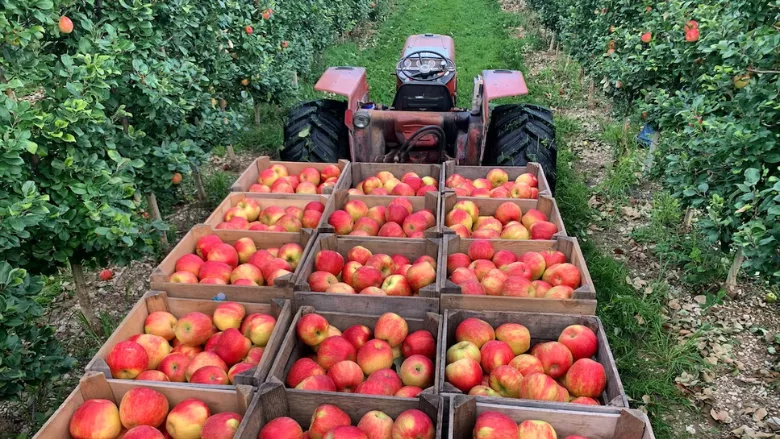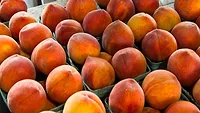Study Evaluating Efficacy of Sanitizers Against Biofilms in Fruit Harvesting

Credit: Terra Slaybaugh via Unsplash
Ongoing research funded by the Center for Produce Safety aims to evaluate the efficacy of commercially available sanitizers against common foodborne pathogens and biofilms encountered during tree fruit harvesting, and then conduct a validation study of the best-performing treatments at commercial facilities.
During tree fruit harvesting, bins and containers that are not effectively cleaned and sanitized can foster microbial growth and provide a reservoir for cross-contamination of produce. Such containers have been implicated in past foodborne illness incidents.
However, undefined recommendations for cleaning and sanitation of harvesting bins and picking bags have created challenges for producers and handlers. The present project therefore aims to develop science-based recommendations that will help improve cleaning and sanitation practices for harvesting operations. Growers and packers may be able to reference the researchers’ work to inform container purchases or sanitizer choices.
Although the present study focuses on apples, the results should be applicable to any commodity that uses wood and plastic harvest bins or nylon picking bags.
The researchers began by testing five sanitizers—chlorine, chlorine dioxide, peracid, steam, and silver dihydrogen citrate—against Listeria monocytogenes, Salmonella, and Shiga toxin-producing Escherichia coli (STEC) on wood, plastic, and nylon coupons. The inoculated coupons were incubated for two, 24, or 96 hours after being exposed to one of the five sanitizers.
Sanitizers were tested against sessile and biofilm bacteria. Sessile organisms are pre-biofilm formation, in the beginning of their growth phase. Meanwhile, biofilms are protected microbial communities highly resistant to sanitizers. Sessile bacteria are more common in facilities that clean more regularly, whereas facilities that clean seasonally may find the data on biofilms more relevant.
Although data is still being reviewed by the researchers, some trends are beginning to emerge. For example, wood is very difficult to clean, and chlorine dioxide has been proving effective at pathogen reduction.
Looking for quick answers on food safety topics?
Try Ask FSM, our new smart AI search tool.
Ask FSM →
The next step of the project will be to conduct trials using the top-performing sanitizers at small-, medium-, and large-scale apple packinghouses in Kansas, Missouri, Iowa, and Washington during summer 2023. The researchers plan to inoculate bins and picking bags previously used by packing facilities. The researchers will then sanitize the containers under packinghouse conditions and observe the levels of pathogen reduction.
Industry helped guide the researchers with input. The project is led by Kansas State University’s (KSU’s) Valentina Trinetta, Ph.D. Co-principal investigators include Umet Yucel, Ph.D. and Manreet Bhular, Ph.D. of KSU; Faith Critzer, Ph.D. of University of Georgia; and Londa Nwadike, Ph.D. of the University of Missouri.








